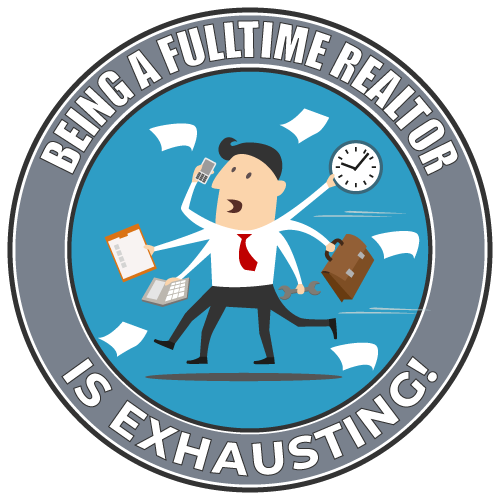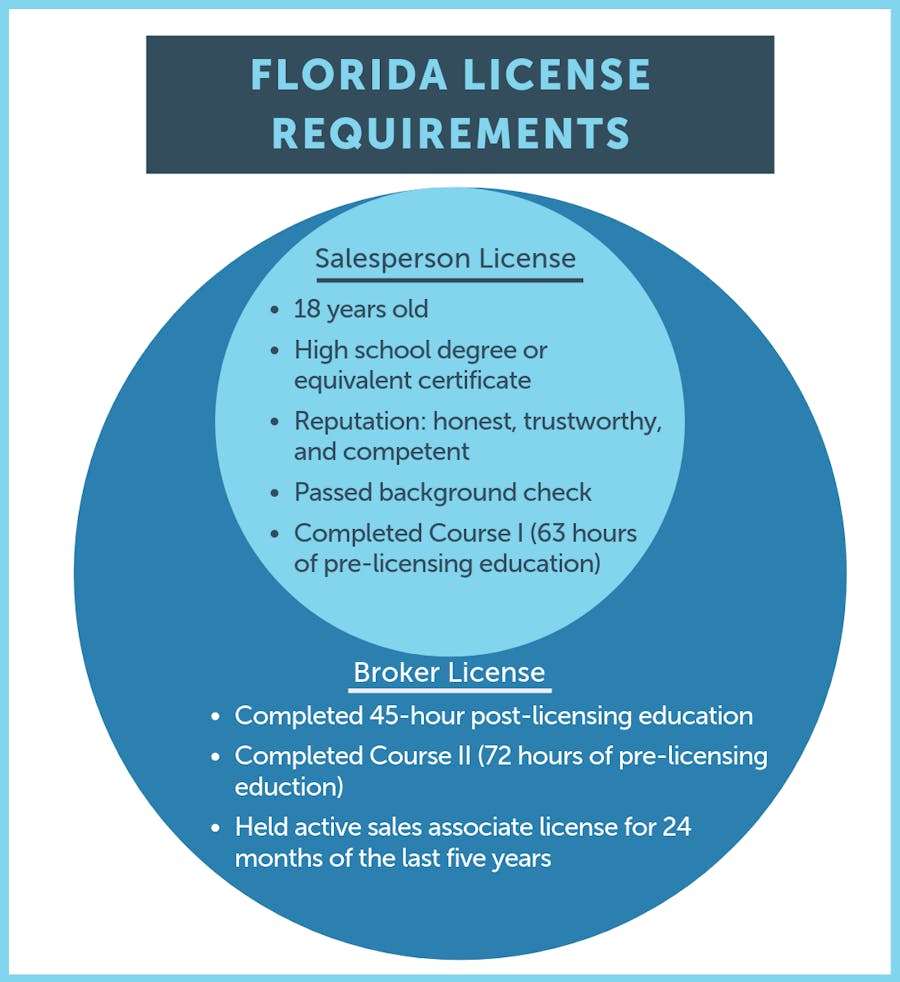
What to do after I get my real estate license
Pre-licensing is required in order to obtain your realty license. The process can take up to two months depending upon the state.
After you pass your pre-licensing training and take the exam, your test results and license application fee will be submitted. This will cost between $50 - $250
Your license will arrive in 7 to 10 business days after you have submitted all the necessary documents. In that time frame, the official photo bearing exam result report will be mailed to you.
Next, you need to find a brokerage to work for. This is an important step in your career as a realtor. It takes a lot of hard work, dedication, and tenacity.

A broker can help you market and introduce clients to your business. You will receive training and support throughout your first years as a licensed real estate agent.
Make sure you are able to sell the type of real property you want through a brokerage. You'll be more successful, and you will make more money over the long-term.
A brokerage that provides ongoing support and education is crucial for your success in real estate. This will give you confidence and allow you the freedom to focus on your business growth.
A second option is to join a professional real estate organization such as AREA (Association of Real Estate Appraisers and Appraisal Directors) or NAR (National Association of Realtors). These associations offer valuable networking opportunities and specialized training that can be extremely beneficial for your real estate career.
For new information, seminars and conferences are a great way to meet other professionals in your field. These events can be held in person or online.

Getting a Real Estate License
There are many methods to get your license as a real estate agent. The process varies depending on which state you live in. The pre-licensing program is the most popular. These courses are both online and available in-person. The course can be completed in just a few days.
Many states require ongoing education, in addition to courses for pre-licensing. These courses keep you in touch with the latest industry developments and help you stay current.
While some courses will focus on topics specific to the real-estate profession, others will address general topics. Before you decide to enroll, it is a good idea to do some research.
Courses offered by online providers vary from one state to the next. Others are given in person at real estate schools. Be sure to factor in the cost of each course.
FAQ
Which is better, to rent or buy?
Renting is generally cheaper than buying a home. It is important to realize that renting is generally cheaper than buying a home. You will still need to pay utilities, repairs, and maintenance. Buying a home has its advantages too. You will have greater control of your living arrangements.
How long does it take to get a mortgage approved?
It depends on several factors including credit score, income and type of loan. It generally takes about 30 days to get your mortgage approved.
What are the most important aspects of buying a house?
The three most important things when buying any kind of home are size, price, or location. Location refers the area you desire to live. Price refers the amount that you are willing and able to pay for the property. Size is the amount of space you require.
What is a reverse mortgage?
A reverse mortgage lets you borrow money directly from your home. This reverse mortgage allows you to take out funds from your home's equity and still live there. There are two types to choose from: government-insured or conventional. If you take out a conventional reverse mortgage, the principal amount borrowed must be repaid along with an origination cost. FHA insurance covers repayments.
Statistics
- When it came to buying a home in 2015, experts predicted that mortgage rates would surpass five percent, yet interest rates remained below four percent. (fortunebuilders.com)
- Over the past year, mortgage rates have hovered between 3.9 and 4.5 percent—a less significant increase. (fortunebuilders.com)
- Based on your credit scores and other financial details, your lender offers you a 3.5% interest rate on loan. (investopedia.com)
- This seems to be a more popular trend as the U.S. Census Bureau reports the homeownership rate was around 65% last year. (fortunebuilders.com)
- The FHA sets its desirable debt-to-income ratio at 43%. (fortunebuilders.com)
External Links
How To
How to Manage a Rental Property
It can be a great way for you to make extra income, but there are many things to consider before you rent your house. This article will help you decide whether you want to rent your house and provide tips for managing a rental property.
If you're considering renting out your home, here's everything you need to know to start.
-
What is the first thing I should do? Before you decide if your house should be rented out, you need to examine your finances. If you have debts, such as credit card bills or mortgage payments, you may not be able to afford to pay someone else to live in your home while you're away. Check your budget. If your monthly expenses are not covered by your rent, utilities and insurance, it is a sign that you need to reevaluate your finances. It might not be worth the effort.
-
How much will it cost to rent my house? It is possible to charge a higher price for renting your house if you consider many factors. These factors include the location, size and condition of your home, as well as season. Remember that prices can vary depending on where your live so you shouldn't expect to receive the same rate anywhere. Rightmove estimates that the market average for renting a 1-bedroom flat in London costs around PS1,400 per monthly. This means that your home would be worth around PS2,800 per annum if it was rented out completely. While this isn't bad, if only you wanted to rent out a small portion of your house, you could make much more.
-
Is it worthwhile? You should always take risks when doing something new. But, if it increases your income, why not try it? You need to be clear about what you're signing before you do anything. Renting your home won't just mean spending more time away from your family; you'll also need to keep up with maintenance costs, pay for repairs and keep the place clean. Make sure you've thought through these issues carefully before signing up!
-
What are the benefits? So now that you know how much it costs to rent out your home and you're confident that it's worth it, you'll need to think about the advantages. You have many options to rent your house: you can pay off debt, invest in vacations, save for rainy days, or simply relax from the hustle and bustle of your daily life. No matter what your choice, renting is likely to be more rewarding than working every single day. If you plan well, renting could become a full-time occupation.
-
How do I find tenants? After you have made the decision to rent your property out, you need to market it properly. You can start by listing your property online on websites such as Rightmove and Zoopla. Once potential tenants contact you, you'll need to arrange an interview. This will enable you to evaluate their suitability and verify that they are financially stable enough for you to rent your home.
-
What are the best ways to ensure that I am protected? You should make sure your home is fully insured against theft, fire, and damage. You'll need to insure your home, which you can do either through your landlord or directly with an insurer. Your landlord will likely require you to add them on as additional insured. This is to ensure that your property is covered for any damages you cause. If your landlord is not registered with UK insurers, or you are living abroad, this policy doesn't apply. In these cases, you'll need an international insurer to register.
-
It's easy to feel that you don't have the time or money to look for tenants. This is especially true if you work from home. You must put your best foot forward when advertising property. Make sure you have a professional looking website. Also, make sure to post your ads online. Additionally, you'll need to fill out an application and provide references. While some people prefer to handle everything themselves, others hire agents who can take care of most of the legwork. Either way, you'll need to be prepared to answer questions during interviews.
-
What happens once I find my tenant If you have a lease in place, you'll need to inform your tenant of changes, such as moving dates. You may also negotiate terms such as length of stay and deposit. Remember that even though you will be paid at the end of your tenancy, you still have to pay utilities.
-
How do I collect rent? When it comes time for you to collect your rent, check to see if the tenant has paid. If they haven't, remind them. After sending them a final statement, you can deduct any outstanding rent payments. If you're struggling to get hold of your tenant, you can always call the police. They will not usually evict someone unless they have a breached the contract. But, they can issue a warrant if necessary.
-
How do I avoid problems? You can rent your home out for a good income, but you need to ensure that you are safe. Consider installing security cameras and smoke alarms. You should also check that your neighbors' permissions allow you to leave your property unlocked at night and that you have adequate insurance. Do not let strangers in your home, even though they may be moving in next to you.